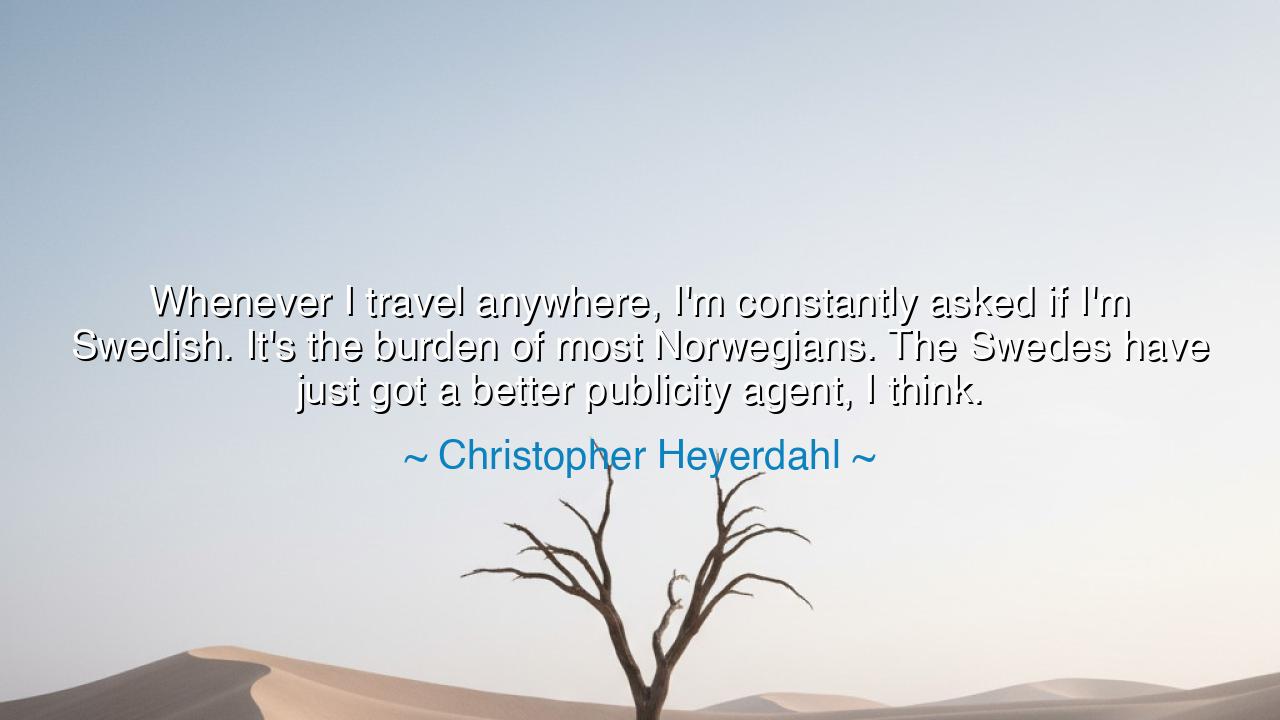
Whenever I travel anywhere, I'm constantly asked if I'm Swedish.
Whenever I travel anywhere, I'm constantly asked if I'm Swedish. It's the burden of most Norwegians. The Swedes have just got a better publicity agent, I think.






"Whenever I travel anywhere, I’m constantly asked if I’m Swedish. It’s the burden of most Norwegians. The Swedes have just got a better publicity agent, I think." Thus spoke Christopher Heyerdahl, with humor and humility, yet within his words lies a lesson that touches upon identity, perception, and the power of reputation. For what he names as a small jest is in truth an ancient reality: that peoples are not always seen for who they are, but for the stories others tell of them. Nations rise not only by arms or wealth, but by the publicity—the tales, the images, the voices—that shape how the world perceives them.
The ancients themselves knew this truth well. Did not Athens, through poets and philosophers, craft a name that still echoes today, while Sparta—though mighty in arms—left fewer words to immortalize itself? Did not Rome spread not only its legions, but its language, its law, and its myths, so that long after the empire fell, its story endured? And did not smaller nations, forgotten by the tongues of chroniclers, fade into shadow though their people lived and breathed as richly as any other? What Heyerdahl calls the Swedes’ "better publicity agent" is in fact the timeless truth that the world remembers not only deeds, but the way those deeds are told.
The burden of Norwegians, then, is not that they lack worth, but that their story has not been sung as loudly. For Norway has given explorers like Roald Amundsen, who braved the poles; artists like Edvard Munch, who painted the anguish of existence; and visionaries like Fridtjof Nansen, who not only traversed the Arctic but labored for the refugees of war. Yet, as Heyerdahl wryly notes, their fame is often mistaken for another’s. This is no judgment upon Norway, but a reminder that the glory of a people must be proclaimed if it is to be known.
History gives us many such examples. The Vikings of old, both Norwegian and Swedish, struck fear and wonder across Europe. Yet the sagas that survived were not evenly told. Iceland, though small, preserved the epic stories that kept its name alive. Meanwhile, other Norse voices grew faint in the world’s memory. It is not only the strength of the people, but the guardians of their story, who shape how they are remembered. Thus Heyerdahl’s jest carries weight: without heralds, even the strongest are mistaken for others.
Children of tomorrow, learn from this: the world will not always see you clearly. You may be mistaken, mislabeled, overshadowed by louder voices. This is the way of nations, and the way of individuals. Do not despair, but take courage. Live with authenticity, and where possible, tell your story. For if you do not speak of who you are, others will speak for you. And their words may not honor your truth.
Practical wisdom lies here. Guard your identity, but also share it. If you are Norwegian, speak of Norway; if you are of any people, speak of their worth, their struggles, their triumphs. Celebrate your heritage, so that others may know it rightly. In your personal life, too, do not let yourself be defined by what others assume. Correct with kindness, and proclaim with confidence. A good life is lived not in shadows, but in the light of truth shared.
Thus the lesson is plain: publicity, whether in jest or in earnest, holds power. Nations and people alike must learn to tell their own stories, lest others’ tales define them. Christopher Heyerdahl’s words, though wrapped in humor, remind us of an ancient truth: that the memory of a people is not only what they do, but what the world believes of them. Therefore, speak your truth, live your heritage, and let your deeds and your words alike proclaim who you are—so that none may mistake your identity for another’s.






AAdministratorAdministrator
Welcome, honored guests. Please leave a comment, we will respond soon